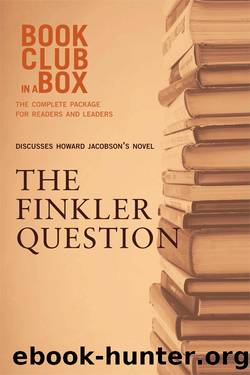Bookclub-in-a-Box Discusses the Finkler Question, by Howard Jacobson by Marilyn Herbert

Author:Marilyn Herbert
Language: eng
Format: epub
Publisher: Bookclub-in-a-Box
The Jewish Question
⢠The Finkler Question, really the Jewish Question, is historically one of turmoil, violence, and racism. The phrase was first used to discuss legal and status issues between Jews and non-Jews in the Age of Enlightenment and the French Revolution. During the 19th and 20th centuries, it became more closely aligned with anti-Semitic feelings. Currently, it refers to Israel and the Diaspora, the areas where Jews live outside of Israel.
⢠The novel ponders and characterizes the Jewish Question through the eyes of Treslove, Finkler and Libor. Each represents a version of the argument. Treslove, an unknowing non-Jew, âThe real McGoyâ (p.260) wants to be part of Judaism, a culture and religion that confuses him greatly. Finkler, an anti-Zionist, pro-Palestinian Jew, might never formally renounce his Judaism but wishes to find like-minded Jews. And Libor is a Zionist whose overwhelming grief causes him to suffer compassion fatigue. Tired of the entire Jewish situation (the Holocaust, and rising anti-Semitism in Europe), Libor still holds onto his Israeli cultural lifeline as a means of defense against potential anti-Semitism.
⢠The concept of the Jewish Question is most famously connected to Hitlerâs Final Solution, the vile attempt to end the very existence of Jews. Treslove gives us a whole new way of looking at the idea of the âJewâ and allows a difficult discussion to take place because he diffuses the emotionality of the subject by renaming it the Finkler Question and referring to Jews as Finklers.
⢠It all began when Julian met Sam at school. Sam was the first Jewish person Julian had ever met. But he knew the stereotypical picture of a Jew was someone who was âsmall and dark and beetling. A secret person.â (p.17) This description has an uncomfortable ring to it, of insect- or rodent-like characteristics, none of which fit Sam Finkler.
Finkler was almost orange in colour and spilled out of his clothes. He had extravagant features ⦠a towering manner that made him look taller than he actually was, and delivered verdicts on people and events with such assurance that he almost spat them out of his mouth. (p.17)
⢠Sam was a sprinkler of words and ideas, which struck Treslove as funny because sprinkler rhymes with Finkler. So, from then on, he privately referred to Jews as Finklers. He transformed the volatile Jewish question into a non-aggressive Finkler Question.
By changing the adjective, has Jacobson given the troublesome topic of Jews and Jewish concerns a safer platform for discussion? Who has permission to discuss this potentially rancorous subject? What was your initial reaction to the title? Have your views changed?
Download
This site does not store any files on its server. We only index and link to content provided by other sites. Please contact the content providers to delete copyright contents if any and email us, we'll remove relevant links or contents immediately.
The Power of Myth by Joseph Campbell & Bill Moyers(1047)
Half Moon Bay by Jonathan Kellerman & Jesse Kellerman(977)
Inseparable by Emma Donoghue(971)
A Social History of the Media by Peter Burke & Peter Burke(966)
The Nets of Modernism: Henry James, Virginia Woolf, James Joyce, and Sigmund Freud by Maud Ellmann(888)
The Spike by Mark Humphries;(805)
The Complete Correspondence 1928-1940 by Theodor W. Adorno & Walter Benjamin(773)
A Theory of Narrative Drawing by Simon Grennan(773)
Culture by Terry Eagleton(768)
Ideology by Eagleton Terry;(729)
World Philology by(711)
Farnsworth's Classical English Rhetoric by Ward Farnsworth(706)
Bodies from the Library 3 by Tony Medawar(700)
Game of Thrones and Philosophy by William Irwin(699)
High Albania by M. Edith Durham(697)
Adam Smith by Jonathan Conlin(684)
A Reader’s Companion to J. D. Salinger’s The Catcher in the Rye by Peter Beidler(674)
Comic Genius: Portraits of Funny People by(643)
Monkey King by Wu Cheng'en(641)
